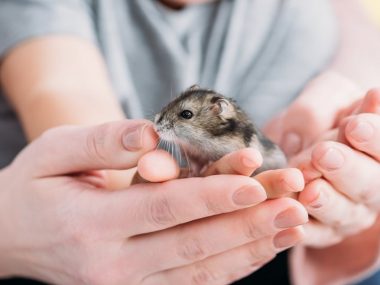Hamsters have extremely short lifespans compared to other pets, and inevitably the time comes that all pet owners dread. You may notice that your once lively hamster has become inactive, and it may no longer respond to you or enthusiastically look about for treats. Knowing what to do when you know your hamster is nearing the end of its life can be incredibly difficult.
Hamsters can be allowed to die naturally if they are comfortable and pain-free. A sick animal should be assessed by a veterinarian who may treat the condition, offer symptom relief or suggest euthanasia to relieve suffering. The hamster’s quality of life must be the primary focus.
Death is an inevitable part of every life. Helping your hamster pass as humanely as possible when the time comes is one of the noblest acts any owner can do for their pet.
Table of Contents
Should I Let My Hamster Die Naturally?
While each situation is unique, the main concern must always be the gentlest and kindest option for the hamster. The first point of call when a hamster looks sick is to ensure that it doesn’t have a treatable condition. However, if your hamster is old, in hamster years, chances are good that the little guy is nearing the end of its life.
Instead of a slow decline that one may expect with advancing age, hamsters often become visibly sick suddenly. A hammie that was enthusiastically running on its wheel the day before may suddenly become hunched and unresponsive.
Hamsters are incredibly good at hiding symptoms of illness. In nature, a visibly sick animal wouldn’t last long, so our tiny pets have mastered waiting until they are really ill before you may notice. Although hamsters are fragile little creatures and can die incredibly quickly if stressed or from conditions like diarrhea, some of our tiny friends become old and frail, leaving their owners unsure about the best way forward.
Living with a beloved pet that is terminally ill can be draining, especially if they hang on for prolonged periods. While hamsters are fragile, well-cared-for pets can linger for longer than anticipated, which can be distressing, and you will wonder if you need to step in.
Here are some things you should consider when weighing up what is the kindest option for your little friend:
- Is it in pain? – This can be difficult to gauge pain in hamsters, but it can sometimes be evident in uncharacteristic behavior like excessive squeaking, hunched over position, or biting when picked up. If the hamster is suffering and the condition is not treatable, euthanasia is the right option.
- Does the hamster eat, drink and urinate? A no to any of these means that the hamster’s body is shutting down. Always consult your veterinarian to check that it does not have a treatable condition and then be guided in your decision.
- Is the hamster having difficulty breathing? Although irregular breathing is one of the final stages in the dying process, there shouldn’t be any gasping for breath or panicked distress behavior. If your hammie is struggling to breathe, euthanasia is the kindest option.
- Is the hamster comfortable? Dying is the natural end of every life. If your little pet has just slowed down significantly but still gets up sometimes to nibble a bit of food or drink, you can just ensure that its environment is comfortable and warm. In this last phase of life, some hamsters crave closeness with their owners, while others prefer to be alone.
Has My Hamster Died, Or Is It Hibernating?
Before deciding that your hamster is dying, always check that the small pet isn’t perhaps hibernating. Although well-cared-for pet hamsters don’t usually hibernate, it does happen, and it can be pretty frightening for hammie owners who are not expecting it!
Frequently Asked Questions
How Long Does It Take For A Hamster To Die?
A hamster reaching the very end of its lifespan will start sending out signs that death is imminent. The actual dying process can take days or be a matter of a few hours. However, there may be a gradual winding down process that can take weeks.
The hamster may linger even if the prognosis is terminal, so it is impossible to gauge ahead of time how long an individual hamster may take to pass.
Caring owners must do everything possible to reduce the amount of suffering experienced. Your vet will advise if quick euthanasia is the most loving option.
Are Hamsters In Pain When They Are Dying?
Hamsters can develop conditions like malignant tumors, or injuries can cause significant discomfort or pain. Medications like meloxicam are available to manage pain, but prolonging the life of a suffering animal should be carefully considered.
A hamster in the end phase of its life, due to natural causes, will adjust its behavior to cope with what it can physically manage. A general lack of interest in regular activities like grooming and feeding are indications that the animal is not feeling well.
Hamster owners must do everything possible to keep the hamster as comfortable as possible in its final stage of life. Keep the cage in a warm, quiet place and provide deep soft bedding so it will feel safe. Speak softly and reassuringly to comfort your hamster and let it know you are nearby.
How Much Is It To Euthanize a Hamster?
Keeping your hamster alive if it is suffering is only prolonging things. Although you don’t want to say goodbye to your little friend, if its body is beyond repair, helping it pass without suffering is a way you can thank it for all the wonderful memories it has given you. Private veterinarian practices have different rates for the procedure that they can give ahead of time. Your local SPCA will also assist with euthanizing your dying hamster; costs range from around $30 for the tiny animal to be put gently to sleep forever.
References:
https://onlinelibrary.wiley.com/doi/full/10.1111/jsap.13527
https://www.bluecross.org.uk/advice/pets/time-to-say-goodbye-to-your-small-pet






